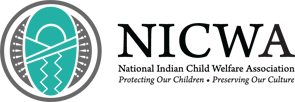ICWA Personal Stories Video Project Launch
(Portland, Oregon, December 19, 2016)—For 37 years the Indian Child Welfare Act (ICWA) has been a critical
protection for American Indian and Alaska Native (AI/AN) children and their families who have often been mistreated and
taken advantage of in state child welfare systems, many times by private adoption interests. Basic protections that all
children and families in this nation receive, like having the support of your extended family and being placed in a home
with a fit and willing relative, unfortunately are being threatened by a small number of self-interested private adoption
advocates and their allies intent on eliminating basic rights and protections for Native people. The general public, largely
unaware of tribal populations and the long-standing body of federal law that applies to AI/AN peoples is strongly influence
by biased, anti-ICWA media that distorts facts and casts tribal communities and Native families in a negative light.
Recognizing the need for ICWA public education materials that can be distributed widely and throughout social media
channels, the National Indian Child Welfare Association (NICWA) partnered with award-winning Producer/Director Karen
Odyniec and Producer Milo Daemgen to produce four short-form digital stories that are informative and emotionally
resonant.
The multi-part digital storytelling series, The Heart of ICWA, features Native families sharing their stories of family
upheaval, perseverance, healing, and ultimately, resilience in the face of threats to their well-being. In this series, families
convey firsthand what happens when the basic protections of ICWA are followed and the devastating consequences when
families and children are deprived of these basic rights.
Over the next month, these videos will be launched on NICWA’s YouTube channel and shared over social media.
NICWA is grateful to the Poarch Band of Creek Indians, who funded this project. Vice-Chairman of the Poarch Band of
Creek Indians and NICWA Board Member Robbie McGhee said, “This project is an important way to educate America
about the widespread forced removal of Indian children from their families, a legacy that unfortunately continues today
with disastrous consequences. ICWA addresses past trauma and protects from future trauma by ensuring that Native
children have the opportunity to stay connected with their families and communities and connected to their culture. Every
child wants to be understood at that very personal and unique level, and having a connection to your family and culture is
what grounds us in our identity and gives us that sense of belonging.”
NICWA Board President Gil Vigil stated, “That’s why thirteen leading child and family advocacy organizations call ICWA
the gold standard in child welfare policy and practice – it keeps children with their relatives whenever possible and
recognizes that you don’t have to lose your family to have a safe and loving home. When children know where they come
from and are connected to their cultural heritage, they do better in life and have higher self-esteem. NICWA is dedicated
to the well-being of Indian children and families, and The Heart of ICWA relays, in a compelling way, why ICWA is so
important to keeping families together.”
To view this press release as a PDF, click here.
# # #
About the National Indian Child Welfare Association (NICWA)
NICWA works to support the safety, health, and spiritual strength of Native children along the broad continuum of their
lives. We promote building tribal capacity to prevent child abuse and neglect through positive systems change at the state,
federal, and tribal levels.
Our Vision: Every Indian child must have access to community-based, culturally appropriate services that help them
grow up safe, healthy, and spiritually strong—free from abuse, neglect, sexual exploitation, and the
damaging effects of substance abuse.
Our Mission: NICWA is dedicated to the well-being of American Indian and Alaska Native children and families.
To learn more about NICWA, visit www.nicwa.org.
